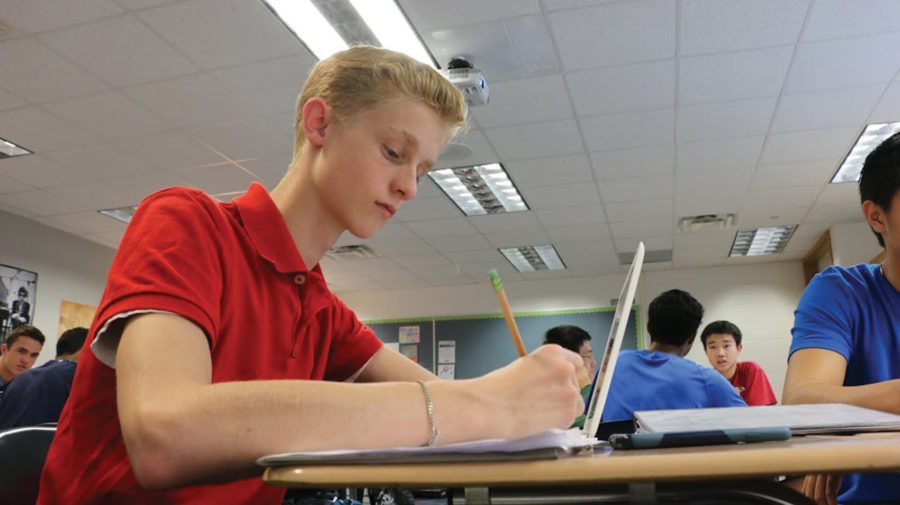One of many other students, junior Natalie Cotherman started taking AP Capstone this year. AP Capstone is a two-year program comprised of AP Seminar, which is taken junior year, and AP Research, which is taken senior year. AP Capstone is one of the few classes at CHS that allows students to participate in project-based learning, a teaching method that involves using projects and presentations as tools to help students learn.
“My other classes are a lot of lecturing and a lot of homework and not as much group work,” Cotherman said. “(AP Capstone) is way different from t he way Carmel has taught English, and I like how it’s more interest-based.”
he way Carmel has taught English, and I like how it’s more interest-based.”
Cotherman said the AP Capstone program allows students to explore their personal interests through projects.
“You’re kind of building your own class almost, because the whole class is research on what you want to research, which I think is interesting,” she said. “Most other classes are (you) kind of being told what to do, and then you go from there.”
CHS is among the first schools to introduce AP Capstone as a class, according to AP Seminar teacher Elizabeth Kahl. The program was introduced to the United States three years ago, and CHS began teaching it last year, putting it within the first 100 schools to offer the course. Although, according to Kahl, there was debate over whether or not CHS should teach this course, the school eventually decided that the benefits outweighed the risks of introducing a new and different teaching style.
“With (project-based learning) courses like AP Capstone, students have a lot more ownership over their learning, and they definitely feel more responsibility. But I think there are a lot of pros and cons to both, because for students who need structure and need a lot of teacher reinforcement, you just have to go that extra mile,” Kahl said.
Junior Jordan “JD” Arland, like Cotherman, is in his first year of AP Capstone. He said project-based learning is the main basis of the class, which makes it very different from other AP classes he’s taken.
“The AP exam (for capstone) is based off of five things: a team paper, a team project, an individual paper, an individual project and the actual exam. So however well you do on your projects actually translates directly into college credit,” Arland said. “Everything we do is based on a project, and we get critiques back from that, and that’s what helps us learn, rather than a lecture setting.”
Arland said he took the AP Capstone program to work towards his career goal in law. Similarly, Cotherman took AP Capstone because she said she thought it would apply more to the real world and help her more going into the medical field.
“I wanted to prepare myself for those research projects that I know I will be doing in college, and I knew that if I’m going into the medical field, the last thing I’m going to be doing is analyzing the meaning of the green light in The Great Gatsby, and I knew that I’d be analyzing actual statistical  data or evidence, so I took (AP Capstone) for preparation,” Cotherman said.
data or evidence, so I took (AP Capstone) for preparation,” Cotherman said.
Because of her positive experiences with project-based learning in the AP Capstone program, Cotherman said she would like to see more of it in her other classes as well.
“For English classes especially, I think it’s definitely something to look into because all of those project-based things are really going to prepare you for the real world,” Cotherman said. “When you’re in the real world you’re going to have to work with other people to create things, which is pretty much what a project is.”
However, Arland said that he thinks other classes are working fine without including project-based learning as heavily.
“I mean, you need a balance,” he said. “You can’t have every class as project-based learning. (AP Capstone) is a kind of a class that’s giving you a different experience, but I’m still looking for the regular high school experience, too. So, I don’t think every class should be project-based learning.”
Kahl said she believes despite the fact that few classes currently offer project-based learning as an option, she said she believes more classes will do so in the future.
She said, “I think we’re going to start to see more of these programs where it is critically thinking and skills-based and there are a lot of team projects and presentations, because when you get to college a lot of majors really require collaboration, so I think we’re going to start to see a jump in classes incorporating that.”




























![Keep the New Gloves: Fighter Safety Is Non-Negotiable [opinion]](https://hilite.org/wp-content/uploads/2024/12/ufcglovescolumncover-1200x471.png)















































![Review: “Family By Choice” is the perfect watch that encapsulates family, love and everything in between [MUSE]](https://hilite.org/wp-content/uploads/2024/12/family-by-choice-1.png)
![Review: “A Phở Love Story” is an exceptional and authentic representation of teenage Vietnamese-Americans [MUSE]](https://hilite.org/wp-content/uploads/2024/12/a-pho-love-story-9781534441941_hr-786x1200.jpg)
![Review: “And the War Came” by Shakey Graves is the perfect year-round album [MUSE]](https://hilite.org/wp-content/uploads/2024/12/IMG_2665.jpeg)
![Review: "Abbott Elementary", a show I can watch with my family and truly enjoy [MUSE]](https://hilite.org/wp-content/uploads/2024/12/unnamed-1.png)
![Review: “We Live in Time” leaves you wanting more [MUSE]](https://hilite.org/wp-content/uploads/2024/12/IMG_6358.jpg)
![Review in Print: Maripaz Villar brings a delightfully unique style to the world of WEBTOON [MUSE]](https://hilite.org/wp-content/uploads/2023/12/maripazcover-1200x960.jpg)
![Review: “The Sword of Kaigen” is a masterpiece [MUSE]](https://hilite.org/wp-content/uploads/2023/11/Screenshot-2023-11-26-201051.png)
![Review: Gateron Oil Kings, great linear switches, okay price [MUSE]](https://hilite.org/wp-content/uploads/2023/11/Screenshot-2023-11-26-200553.png)
![Review: “A Haunting in Venice” is a significant improvement from other Agatha Christie adaptations [MUSE]](https://hilite.org/wp-content/uploads/2023/11/e7ee2938a6d422669771bce6d8088521.jpg)
![Review: A Thanksgiving story from elementary school, still just as interesting [MUSE]](https://hilite.org/wp-content/uploads/2023/11/Screenshot-2023-11-26-195514-987x1200.png)
![Review: "When I Fly Towards You", cute, uplifting youth drama [MUSE]](https://hilite.org/wp-content/uploads/2023/09/When-I-Fly-Towards-You-Chinese-drama.png)
![Postcards from Muse: Hawaii Travel Diary [MUSE]](https://hilite.org/wp-content/uploads/2023/09/My-project-1-1200x1200.jpg)
![Review: "Ladybug & Cat Noir: The Movie," departure from original show [MUSE]](https://hilite.org/wp-content/uploads/2023/09/Ladybug__Cat_Noir_-_The_Movie_poster.jpg)
![Review in Print: "Hidden Love" is the cute, uplifting drama everyone needs [MUSE]](https://hilite.org/wp-content/uploads/2023/09/hiddenlovecover-e1693597208225-1030x1200.png)
![Review in Print: "Heartstopper" is the heartwarming queer romance we all need [MUSE]](https://hilite.org/wp-content/uploads/2023/08/museheartstoppercover-1200x654.png)




